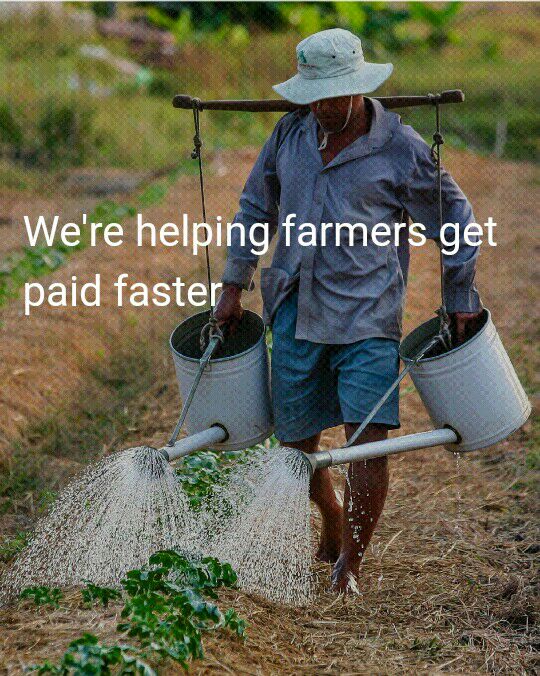
Banks, who traditionally are the main providers of financial services have undergone a lot of dramatic changes in the last couple of decades.Much of these changes were as a result of the growth in modern technology.Transfer of money from peer-to-peer and across geographical barriers which hitherto was not possible can now be achieved with the aid of technology.Banking infrastructural facilities are
spread across the world in order to make such services possible.However,there seems to be a concentration of these facilities and in cities and economics hubs.The end result is that a vast majority of the population are left with none or inadequate access to financial services.Part of the problem is that modern banking are institutions with centralized infrastructure and authority which cannot accommodate the needs of everyone.This is especially true in developing world and in the rural settlement.It is estimated that a third of world’s adult population are unbanked or underbanked-that means a whopping 2 billion adult without a bank account(1).Modern banking infrastructure is therefore not all-inclusive.They are limited in scope and cater mostly to the needs of the affluent members of society.A second problem centres on the cost of financial services in place some places where they are available.This is also in some way related to the centralized nature of the industry.
Current challenges to financial services delivery
Creating universal access to an efficient, inclusive and cost-effective financial service, particularly in developing countries, remain an illusion despite various attempt aimed at achieving it.Some of the current challenges faced by traditional institutions in reaching the unbanked are highlighted below:
- Lack of Valid Identification Documents- KYC (know your customer) requirements are essential for opening bank accounts.An estimated 1.5 billion persons are without a valid or an official means of identification(2).Without many remedies to this,it means this class of persons will have difficulty in accessing financial services by particularly traditional banks who are currently the major player.
- Lack of Financial Literacy-with the financial literacy level still low in some regions, access to good financial services is limited.People are only able to access services they are aware of its existence.Coupled with the fact that they make some ill-informed choices which may hamper future access to financial services e.g bad loans or investments in a fraudulent enterprise.
- Lack of Trust and Understanding of Technology- This has a direct correlation with their level financial education.People generally do not trust what they do not understand.Mobile or internet services deployed by banks, for example, may remain unused if there is a low level of trust by users.
- Low Evaluation of the Under banked-This comes from the wrong estimates by financial service providers.With figures at the lower end of the spectrum, there is little incentive to devote resources to this segment of end users.Banks have failed to realize the huge potential of this segment of society.
- High Cost of Financial Services-There is little incentives for financial service providers to set up offices in rural areas.Such providers will often have to build the infrastructure from the scratch-building, IT deployment, software, internet services, personnel etc.When they do, the total cost involved is transferred to end users which makes such service very expensive and therefore inaccessible to many.
Part of the attempts by traditional service providers(mainly banks) has been to introduce mobile and internet banking services.While this has been helpful, it has a lot of limitations, part of which is aforementioned.Also, a large chunk of the world’s population is without access to internet services or reliable electricity (due to the cost of smartphones or the absence of internet services itself).This created opportunities for other providers of financial services such as:
a.Mobile Money Operators -these are companies which integrate of mobile networks with financial services.e.g M-Pesa in some parts of Africa.They have been very helpful in reaching some segments of the unbanked.They have the advantage of speed but interoperability between different operators and across different countries is often a challenge.Also, they hoard data as a proprietary advantage instead of giving data back to the customer.
b.Thrifts Collections/Local Adhoc Networks-These are closed network of friends, family member or small market unions or associations who provide small savings and loan schemes usually on a rotational basis.They are grass-roots and are focused on rural communities.They have the advantage of ease of operations but are often faced with the issue of scaling and in are not usable for credit records.Much of their dealing is without proper documentation and may be open to abuse.
c.Other Blockchain projects- The blockchain has in modern times shown to be an efficient means to store and transfer value.The emergence of bitcoins, for example, created new opportunities in financial service delivery.A lot of persons without bank account could then be reached.A lot of blockchain projects are finding increasing use in micropayments and making much progress in reaching the unbanked that are traditionally unreachable by banks.However, adoption is a critical issue as it requires some technical knowledge, education and access to the internet.
The aforementioned are some of the reasons why access to an efficient, cost-effective financial service is still an illusion in most places.
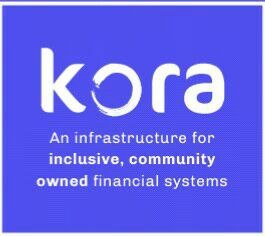
The Kora Network- an Inclusive Financial Service Ecosystem
The Kora Network is a self-sustaining,community-owned ecosystem which is aimed at providing inclusive financial services to all segments of society with a particular focus on the unbanked.It will facilitate the transfer of money between community members as well as generate wealth for all through its approach community-centred approach and its unique infrastructure.Kora is based on the blockchain, accessible via SMS/USSD codes or with internet via a mobile application.Its services can be accessed through cheap/regular phones (in contrast to other blockchain-based solutions to financial services).Unlike traditional financial service providers, Kora network is a decentralized ecosystem owned by the community.Kora recognizes the weakness as well as the strength of some of the existing financial networks and will work them to create an evenly distributed access to financial services for all.It is also important to note that Kora Network in itself is not a licensed financial institution (like banks) nor will it provide financial services directly, rather it is a platform that integrates users of financial services, merchants, organisations and other financial service providers into a self-sustaining,community-owned financial ecosystem.This will makes Kora acceptable locally in different countries as it will thus be in compliance with regulations.The goal of Kora is in providing a cheap, efficient and even distributed financial services particularly to the under banked.
At the heart of Kora are community-centred players who will help drive the various facets in delivering financial services to its subscribers.It will consist of:
- Users- These are subscribers to Kora Network.They will need to comply with local regulations in their country as regards financial services before joining Kora.eg.KYC requirements by governments.
- Agents- These will be members of the platform who will help facilitate exchange between e-fiats and local currencies for commissions.They will help make financial services available to the grassroots.They are cash points who maybe local convenience stores or small businesses.
- Merchants -These are businesses that accept e-Fiat as payment methods.They will help the Kora network run efficiently without the need to constantly exchange e-Fiat to local currency when making purchases.
- Providers- These will help give users access to financial services on the Kora network.They will be responsible for making sure that local regulatory requirements(KYC/AML requirements)are met before giving access to financial services.They are expected to be banks or other financial service operators such as mobile money operators. Kora will provide them with new market opportunities, a turn-key platform as well as a white-label customer interface with KYC tools.No need for the additional cost that would have been incurred for physical infrastructure, IT, logistics, staff expense etc.Kora will essentially make launching a financial service business cheap and easy.
Payment within Kora Network
Payments within the Kora network will employ the use of e-Fiats which will be digital versions of national currencies backed by cash reserves on a 1:1 ratio.The use of e-Fiats as (opposed to the use of tokens) will make for easy adoption of Kora as they will be easily usable and will achieve better trust by local communities.Transfers of e-Fiat between person will require at a minimum the use of SMS/USSD codes from any mobile phone(not necessarily a smartphones which may be too expensive for most rural dwellers).No need for internet services before transactions can occur.This would typically not be possible for transfer of tokens or cryptocurrencies.
Kora will also have its own native utility tokens called the Kora Network Tokens.KNT will be used only as staking units for selecting block producers and for paying other network-related charges.Block producers who confirm transactions for the network are paid in KNT. Ownership of KNT confers a partial role in the Kora Network and as such income.
Community Value Networks
Kora will not eliminate the existing service providers, rather build on the progress that has been made and address the prevailing challenges.Kora believes better results can be achieved if it engages the local communities since they are the recipients of Kora services.Therefore, local ad hoc financial service providers will be integrated into Community Value Networks (CVNs).CVNs will make use of the Kora infrastructure and will, therefore, receive the associated advantages that are lacking in their former local ad hoc and in mainstream financial service providers.They will help in delivering financial services to the grassroots.CVNs will help break some of the barriers to financial services delivery.They will attest to the identities of its members, pool capital in e-Fiats for lending to its members, infrastructure investment or bulk purchases as in the case farmers CVNs, social assistance and financial education of its members etc.CVNs will also help in improving operational transparency, establishing anti-corruption practices as well as governance of their CVNs
The Kora infrastructure
The Kora network is built on four layers of infrastructure to provide for low-cost and universally accessible financial service.These layers are;
- Protocols — This fundamental layer defines the basic rules everyone in the network must abide by.Scalability, Byzantine fault tolerance and immutability are some of its desirable components.
- Data — This layer is where immutable blockchain data resides.Basically, it keeps a record of whatever the user chooses to store on the blockchain.Such data includes identities,transactions records,attestations,account balances,smart token contracts etc.
- Application- This layer makes use of the data stored on the blockchain.Transaction processing, data feeds, blockchain monitoring and integrations with outside systems occur here.It is the transition layer between other pieces of software and the blockchain.
- Access- This layer is completely off the blockchain.It is how the user accesses the network, whether through full nodes,smartphone access or mobile access via a provider.
Why Kora?
Kora identifies the problems of the financial service industry and takes into account the various solutions that have been offered to tackle the problem.Kora incorporates both blockchain solutions and traditional methods to reach the unbanked with financial services.The unique advantages Kora offers through its infrastructure will bring the following advantages:
- Low Cost- Kora will simplify the operations of financial service institution.It will remove the cost of infrastructure and expense incurred running a front-to-back financial institution.With the reduced cost of launching financial services, Providers can then deliver services at a cheaper cost.Providers only need to join the Kora network and make use of the already available infrastructure.The Kora network software can be customized to suit the specific need of each Provider
- Identity Verification- Kora will provide a flexible on-boarding process in full compliance with existing laws and regulations.The use of CVNs will also be helpful in verifying identities of its members.Identity verification will be an on-going process as there may need to increase transactions limits subscribers as more documentation become available.
- Universal Access- Kora will ease access to financial services through the basic use of mobile phones SMS or USSD codes.Limited access to internet services or inability to own a smart phone is not a barrier to access the services through Kora network.Users transactions history is still stored on the blockchain and is available when the user migrate to the use of a smartphone.This will make it easy and cheap to access financial services.
The aforementioned are will drive the adoption of Kora as a financial service tool to reach the unbanked.
Kora Use in Remittances
International remittance is a major source of funds for families, particularly for developing countries.People can send funds to their loved ones in an easy and inexpensive way through the use of the Kora network.Traditional methods will often charge 5- 10+ percent of the sum being transferred and will take a couple of days to get to the recipient.Typical case scenario, a man in London wants to send money to his mum in Nigeria using Kora; He has two options(highlighted in the diagram below).He pays a small network fee in KNT and money is sent via Text or USSD to his mother in Nigeria.The mother in Nigeria receives code or SMS and redeems same for cash at a local convenience store/KNT agent closest to her.Alternatively, the man can send the money using his local KNT agent in London, also pay some small fees to facilitate the transfer.Either way, the mother receivers the funds and redeems them for cash at her local KNT agent/convenience store.
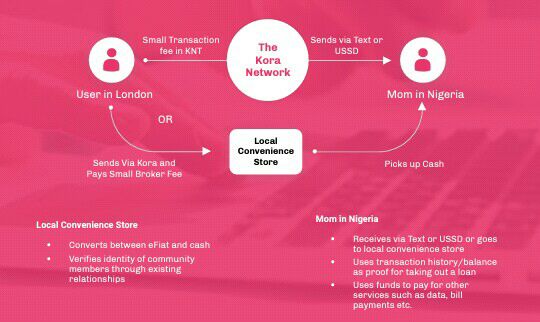
Kora use in Lending and Loaning
Banks and other financial services providers may not be able to provide loans to deserving members of society due to poor credit records.Kora can Providers such records as each transaction is recorded on the blockchain.Member will be able to obtain loans either directly from Service providers or through the help of CVNs.CVNs can create modalities and governing regulations for the disbursement of such loans.
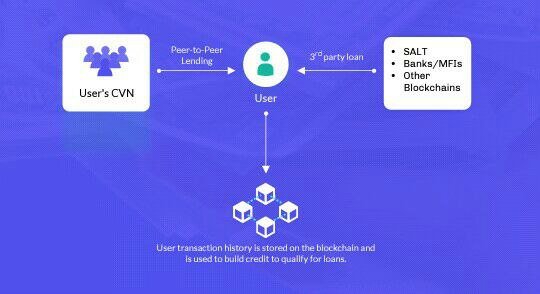.jpg)
Kora Use in Agriculture
Farmers constitute a large portion of rural communities which are often without any financial institutions.Receiving payments for farm produce supplied to large corporations or buyers is often delayed due to the absence of banking infrastructure.Payments are often made by hand or through middlemen.Middlemen can be very corrupt and delay payments, coupled with other security challenges.Kora can easily bridge the gap and farmers will receive payments directly.Also, farmers can form local CVNs and set the governing rules.They can create a cash pool for loans and for bulk purchases of seedling, farm machinery and other expense.
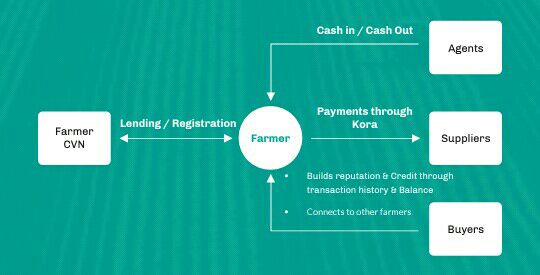.jpg)
KORA Token Sales
Kora is offering early investors the opportunity to be a part of its network through ownership of its network tokens-Kora Network Tokens.KNT will be used to as staking units for selecting block producers and producers use it to pay for network fees.The essence of the token sales is to ensure decentralization of token ownership which is good for crypto-economic stability and also to raise capital for further research, growth and development of the network.Further details on token sales and token generation event can be found on https://kora.network/tokensale.html
Kora is definitely an innovative ecosystem, a much-needed solution the billions of the unbanked individuals who are in dire need of financial services.The unbanked need to be reached for a better distribution of the world’s resources
Sources:
Website:https://bountyhive.io/join/Kora%20Network
White paper:https://kora.network/downloads/Kora%20White%20Paper.pdf
Token sales: https://kora.network/tokensale.html
References
1.https://openknowledge.worldbank.org/bitstream/handle/1et0986/4173/WPS4981.pdf
2.http://documents.worldbank.org/curated/en/156111493234231522/pdf/114628-WP-68p-TheStateofIdenticationSystemsinAfricaASynthesisofIDDAssessments-PUBLIC.pdf
Written by Imuetinyan Matthew
https://steemit.com/@imuetinyan
https://twitter.com/tinyan007
https://medium.com/@ImuetinyanM
username Idex
Downvoting a post can decrease pending rewards and make it less visible. Common reasons:
Submit